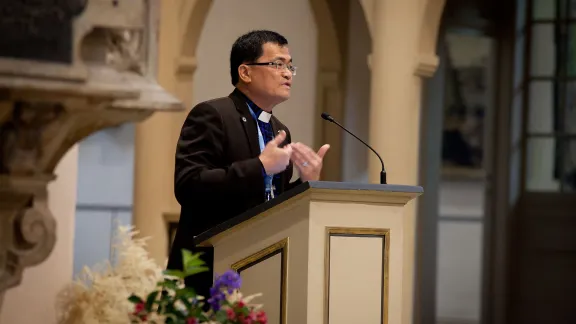
LWF Council member Bishop Aaron Chuan Ching Yap says the international Lutheran-Catholic dialogue provides impetus for Malaysiaâs Christians to move forward and embrace each other in a spirit of reconciliation. Photo: LWF
(LWI) – Inspired by the international dialogue between The Lutheran World Federation (LWF) and the Catholic Church, Malaysia’s Lutherans have initiated discussions for closer collaboration among Christians in the country.
Bishop Aaron Chuan Ching Yap of the Lutheran Church in Malaysia says leaders of the four LWF member churches in the country see commemorations of the 500 years of the Reformation in 2017 as “an excellent opportunity to highlight the common witness of churches in the country’s pluralistic and multi-faith society.”
The “From Conflict to Communion” joint report on the history of the Reformation by the LWF and Pontifical Council for Promoting Christian Unity (PCPCU) provides a strong basis to seek closer relations for common witness, Yap notes.
Study committees have been formed to study the 2013 document, and Catholics and Lutherans have started discussions on how to commemorate next year’s Reformation anniversary “within the wider ecumenical context in Malaysia,” he says. Future discussions will include common projects that the churches could undertake jointly.
In our context, emphasis on justification by faith alone as the basis of our Christian faith enforces this solidarity among churches. We can move forward to embrace each other in a spirit of reconciliation.
Joint declaration signing in Malaysia “a miracle”
The member of the LWF Council describes as “truly a miracle” the signing of the 1999 LWF-PCPCU Joint Declaration on the Doctrine of Justification (JDDJ) by Lutherans, Catholics and Methodists in Penang Island, end of April 2016.
“It’s a miracle because it is only the work of the Holy Spirit that made it possible for all three denominations to sign the JDDJ at a national level in April. While all Christian bodies promote harmonious co-existence with our brothers and sisters from the Muslim and other communities, there hasn’t been much theological dialogue and collaboration among us – especially the Catholics and Protestants churches,” he notes.
The JDDJ signing at the 15th triennial General Assembly of the Council of Churches of Malaysia (CCM) was itself significant, because representatives of churches and organizations that were not part of the preceding dialogue witnessed and took part in the ecumenical worship service. The Catholic Bishops’ Conference is not a member of CCM, the Protestant organization established through its predecessor body in 1948 to foster mutual support among members. “Having the Catholic Archbishop Julian Leow join in the full proceedings of the CCM general assembly was a historic occurrence,” Yap recalls.
“The signing was a joyous moment, ushering in a new era of visible unity and cooperation in a country where Christians are a minority,” he stresses. “We all represent different Christian traditions. The JDDJ signing strongly articulated that Protestants share the joy of the gospel of Jesus Christ with Catholics as part of the larger church, and that we can witness together in our society.”
He continues: “In our context, emphasis on justification by faith alone as the basis of our Christian faith enforces this solidarity among churches. It becomes easier to explain to others that we are not defined by the historical differences that split the church in the sixteenth century. We can move forward to embrace each other in a spirit of reconciliation.”
Solid theological dialogue
At the signing ceremony, Methodist theologian and CCM General Secretary Rev. Dr Hermen Shastri said the event was significant “for churches in this country, because it highlights the fact that ecumenical dialogue does bear positive fruits.”
Anglican Bishop Datuk Bolly Lapok, who presided over the assembly noted the 21st century is seen as the period that will close the great divide between the Roman Catholic and Protestant churches globally. “There is great hope and anticipation that we may be able to live in the healing of Christian divisions in our life time, grounded in solid theological dialogue and commitment,” he said.
Christians make up around 9 percent of Malaysia’s population of 31 million people. The four LWF member churches have a combined total of nearly 130,000 members.


